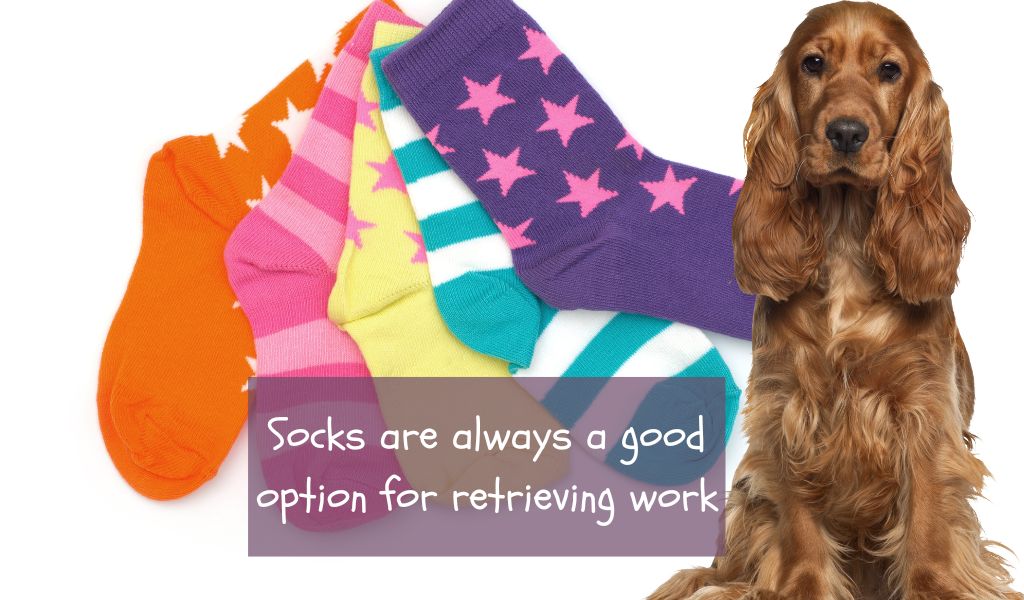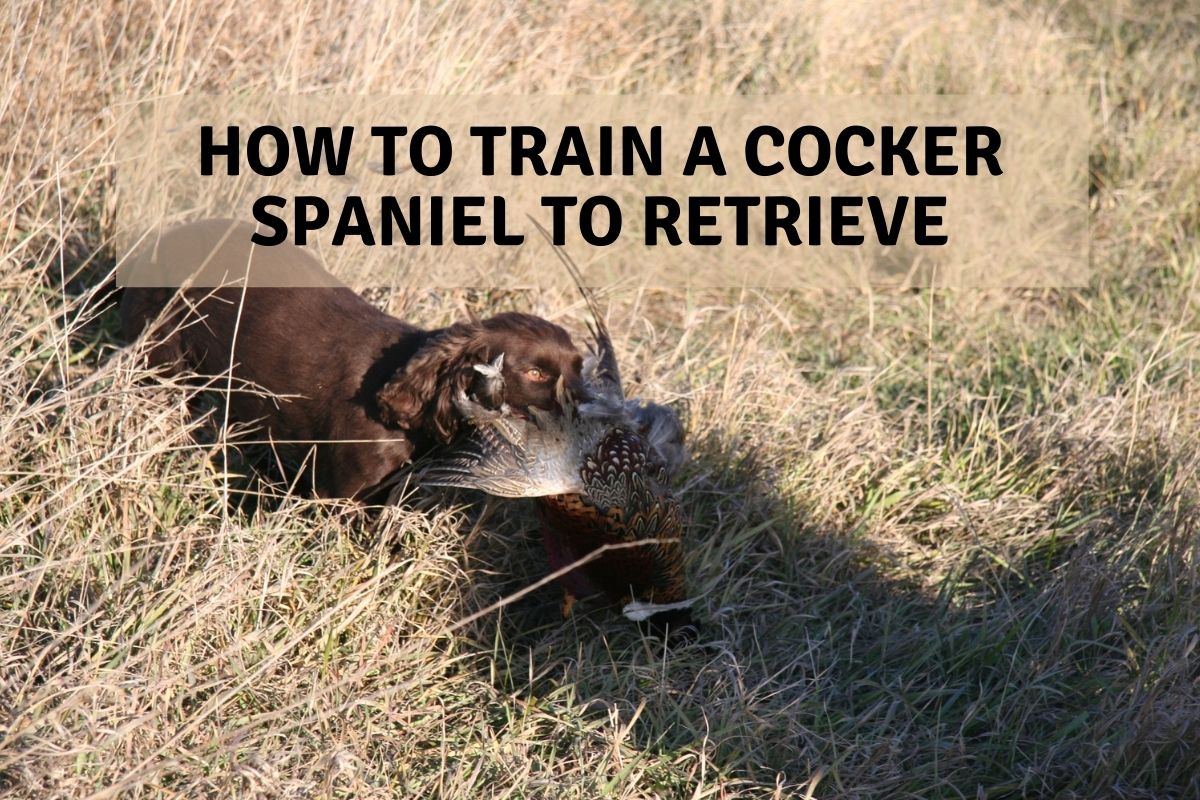Cocker spaniels are bred to hunt and, for many, that drive to explore and thrash their way through cover in pursuit of game can be so powerful, that things such as retrieving are simply boring.
If a young Cocker spaniel is allowed to hunt too much at an early age, then his desire to hunt will take over everything else and it is possible that this will affect his interest in retrieving.
Start early with your Cocker spaniel, when he is a puppy. Encourage him to pick things up and to carry them around, this could be a rolled up pair of socks, a soft ball or even an old slipper. Help him to get used to the feel of things in his mouth. Whenever he comes up to you, make a big fuss of him and gently take the item from him.
Cocker spaniels are natural retrievers
Well bred, working Cocker spaniels are natural retrievers and, if you are careful, then your Cocker will be both and excellent hunting dog and a competent retriever.
As a spaniel trainer you can work with your Cocker’s natural ability from an early age and as soon as he comes to your home.
Encouraging your Cocker spaniel to retrieve
My favourite item for a Cocker puppy is a pair of rolled up, thick socks.
They are nice and soft and are easy for a puppy to get hold of – they also have a reasonable scent to them.
Let the puppy see the socks, maybe wave them around a little to get him interested in them, and, then roll them down the hallway and let him charge after them.
Tell him to ‘fetch‘ – this is the command you’ll use from now on for retrieving.
As soon as he picks them up tell him he is a good dog and encourage him.
There is a chance that he may come back to you and, if he does, tickle him and have fun before taking the socks off him and throwing them again.
There is also a good chance that he will run off with the socks. If he does then don’t panic, just ignore him and, if he eventually brings them to you then make a fuss of him and, if not, then just try is again later.
It will come, you just need to take your time with him.

Making progress with Cocker spaniel retrieving training
As your Cocker spaniel grows older and once he has had all of his vaccinations, you can begin to think about some more exercises for your puppy.
The garden is a great place to start, you don’t need a lot of room and it allows you to keep your puppy safe and secure while you are working on his early retrieving exercises.
It is important that you keep this ‘training’ as easy as possible, use the lawn if you have one, somewhere nice and soft, with short grass so the puppy can see the ball or rolled up socks.
Do not overdo the retrieves, you don’t want him to get fed up – one or two retrieves is quite enough for a youngster.
Don’t be fussy when training a Cocker spaniel to retrieve
You may have seen some spaniel trainers and other gun dog trainers that get their dog to sit down before giving the retrieve to their handler.
There is really no need to get any spaniel to do this. Even if you aspire to enter working tests or even field trials there is no need or expectation for a spaniel to do this.
You’re just adding an extra hurdle to your training.
Your sole objective is to have a well trained Cocker spaniel that will hunt steadily, flush game without chasing and retrieve nicely to hand.
There is no point and no added value in trying to get a spaniel to sit down when he retrieves – why make things harder than they have to be?
Don’t do too much retriever training with a young Cocker spaniel
It is really important that you don’t overdo retriever training with Cockers or with any spaniel breed.
Cockers can quickly become bored with retrieving exercises as most of them want to get on with the really interesting activity called ‘hunting’.
If your spaniel seems to be getting fed up, then ease off with the retrieving work and look for something that will reignite his interest.
I have experienced this with spaniels in the past and the best way that I resolved it was to buy some fur dummies from which the dogs loved and enjoyed retrieving.
You will need fur dummies in the future and I’ve found some good deals on Amazon which you’ll find here.
Developing a Cocker spaniel’s retrieving skills
As your Cocker grows older and becomes keener to retrieve, you will need to develop his ability which simply means making the challenges more and more difficult so that he learns.
In all aspects of training a Cocker ( or for that matter any spaniel ) we are looking to encourage him to trust his nose and to work with his sense of smell.
As you are out and about with your dog, let him run free, attract his attention and when he looks, throw a small dummy or tennis ball into some light cover ( such as rushes, low bracken or long grass), let him run in and hunt the dummy out.
To make it easier for him, at the start throw the dummy into the wind, so that the scent is blowing towards him.
Let him hunt the dummy out and, when he finds it, encourage him to retrieve it to you.
By throwing the dummy into cover, not only are you developing his ability to wind (smell) and retrieve, but you are also building foundations that will help him with his future hunting.
See my Cockers working on their retriever training
FAQs
What age should I start training my Cocker Spaniel to retrieve?
It’s best to start training your Cocker Spaniel to retrieve as early as possible, ideally around 8 to 12 weeks of age.
How do I introduce retrieving to my Cocker Spaniel?
Begin by using a soft toy or a small dummy specifically designed for training. Encourage your dog to chase the toy, and once they pick it up, reward them with praise and treats. Gradually increase the distance and difficulty of the retrieve.
How can I make retrieving more enjoyable for my Cocker Spaniel?
Make sure to keep the training sessions fun and positive. Use high-value treats or rewards, play games, and give plenty of praise and affection to motivate your Cocker Spaniel.
My Cocker Spaniel doesn’t show interest in retrieving. What should I do?
If your dog lacks interest in retrieving, try using a different type of dummy such as a fur dummy like this fur dummy ball that is much more appealing. Experiment with different types of retrieves, such as rolling the ball on the ground to create a scent trail.
How can I teach my Cocker Spaniel to bring the retrieved item back to me?
Start by training your dog to come to you when called. Once they reliably come, incorporate the “fetch” command and reward them when they bring the item back. Use positive reinforcement to encourage them to release the object in your hand.
What are some common mistakes to avoid while training my Cocker Spaniel to retrieve?
Avoid using force or punishment, as it can create negative associations with retrieving. Also, don’t rush the training process—take it gradually and ensure your dog is comfortable and having a positive experience.
Should I use a specific type of retrieve training equipment?
Consider using a training dummy or a soft toy specifically designed for retrieving. These items are lightweight and easy for your Cocker Spaniel to carry.
Moving up a gear
To advance the retrieving ability of your Cocker spaniel you will need, by now, to be adapting other aspects of spaniel training into your daily routines and these will include more advanced training techniques including:
Sitting and staying when commanded
Taking hand and verbal signals
Negotiating obstacles such as streams, water features, walls and fences
Of course, in addition to these activities you will also be working on your Cocker’s key skill of hunting and flushing game.
Final Words
Training a Cocker spaniel to retrieve well is not a difficult task but it does take work and some element of caution.
Don’t overdo the retriever work but, by the same token, introduce it early on before you allow your Cocker to hunt.
Keep the training interesting, if your dog switches off, then look for something interesting for him to fetch, such as a fur or feather dummy and maybe take a few days off from training.
Look for opportunities to create an interesting challenge for your Cocker to work out, such as a retrieve over a low wall, across a stream or in tricky weather conditions when scent might not be too good.




